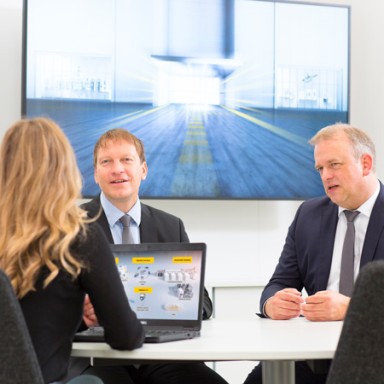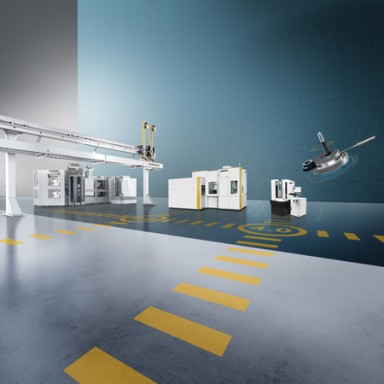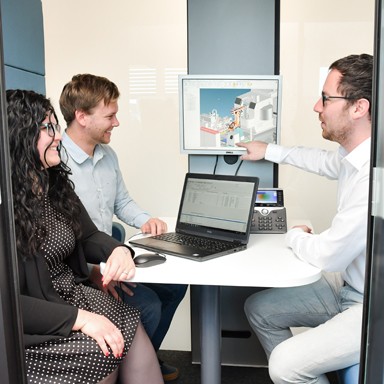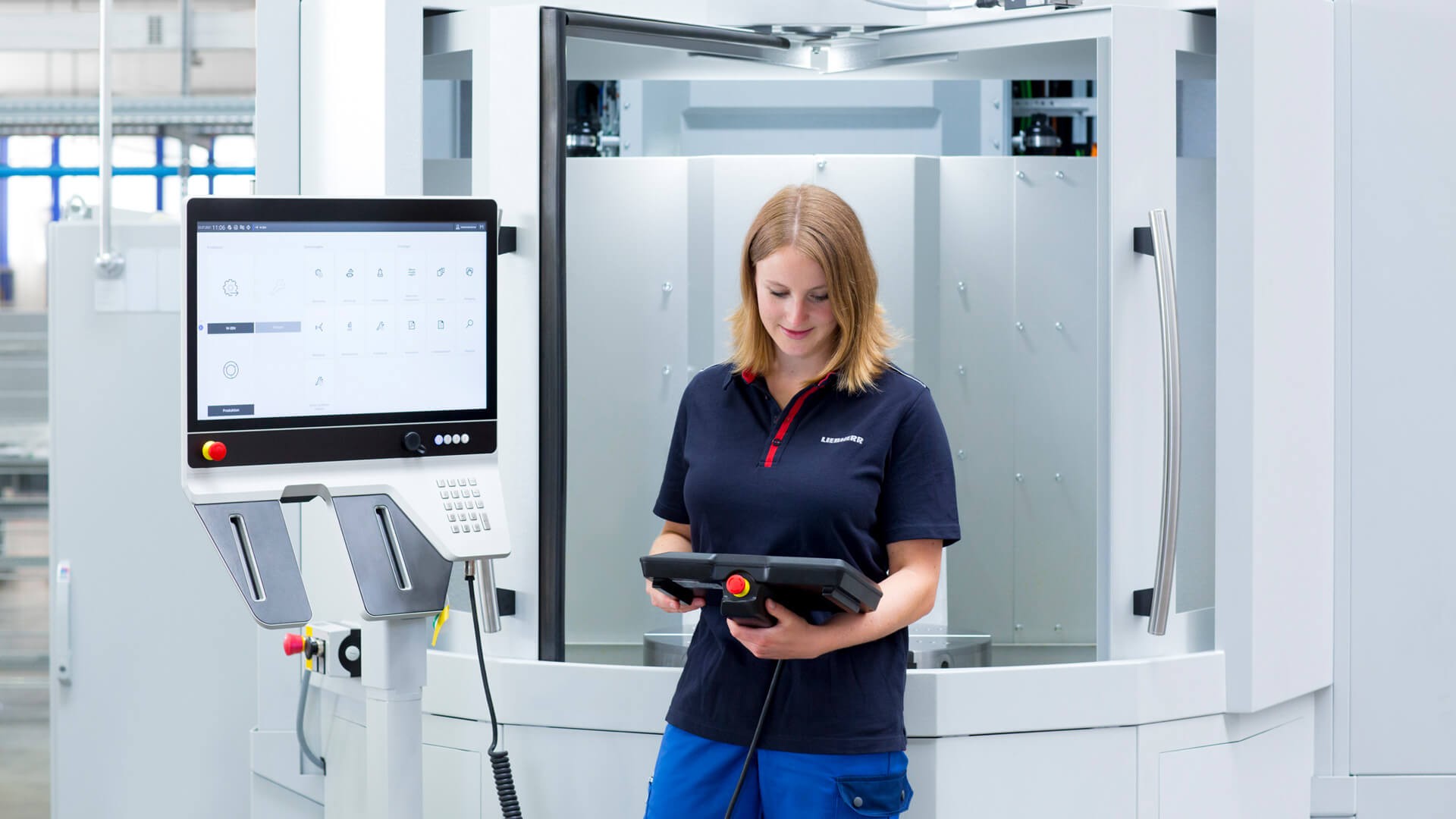
Girls and technology – that’s a match!
Even though the proportion of women in technical professions is increasing, they are still under-represented in many companies. That’s not the case within Liebherr: for over 30 years, the company has been cooperating with the Maria Ward girls’ secondary school in Kempten. The vocational orientation project “MuT – Mädchen und Technik [Girls and Technology]” aims to increase interest of young women in technical professions at an early stage. We discussed this project from different perspectives.
What is “MuT – girls and technology”?
An initiative by the Maria Ward secondary school in Kempten and Liebherr together with the state employment agency, the district of Oberallgäu and the city of Kempten. It gives schoolgirls in Years 8 and 9 the chance to try out a technical profession practically and in detail, in three successive modules.
School
Module 1
Foundations of tool and material science, manufacture of simple workpieces and assemblies (5 x 3 hours per week)
Module 2
Production of more complex workpiece groups, insight into work organization and carrying out complex workflows (5 x 3 hours per week)
Liebherr
Module 3
Connecting mechanical and electronic basics in Liebherr’s training department (one week, afternoons)
The MuT project is now an indispensable institution for vocational orientation and work experience to introduce young girls to technical professions. How did it all start?
Walter Ferstl: My colleague at the time, Siegfried Nußmann, and I were convinced that it doesn’t matter who assembles or commissions a machine – whether it’s a boy or a girl. In 1990, I approached the vice principal at the time of the Maria Ward girls’ secondary school. Together, we organized information evenings and factory tours, which were intensified with his successor Wolfgang Kern and the school principal at the time, in order to increase girls’ interest and to convey to them that technical professions are not just for boys.
Wolfgang Kern: I remember it well! Above all, the parents were very skeptical. They thought that the operation of machines was heavy manual labor and only for boys. At one of our information evenings, a Liebherr trainee got on the podium and talked with enthusiasm about her work. She was around 5 foot three and very petite – which really shook the image of a strenuous male profession!
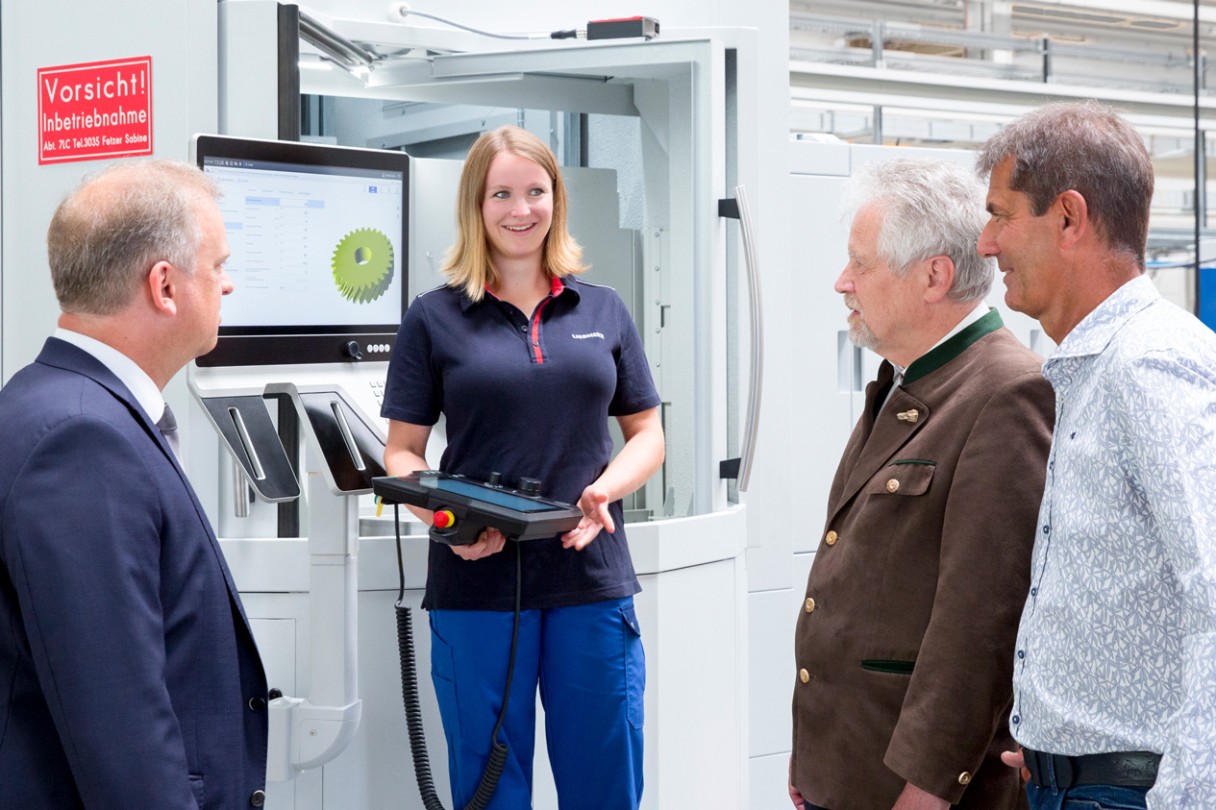
Michael Messer (General Manager Production, Liebherr-Verzahntechnik GmbH), Wolfgang Kern (Principal of the Maria Ward girls' secondary school in Kempten) and Walter Ferstl (Industrial Head of Training, Liebherr-Verzahntechnik GmbH) visit Sabine Fetzer at her workplace
Ms Fetzer, you completed the MuT project a few years ago and then started training to become an electrician for industrial engineering at Liebherr. What made you decide to take on a technical profession?
Sabine Fetzer: I was always interested in technology. My favorite subjects at school were physics and technical drawing. I was therefore certain that I wanted to participate in the MuT project, and this definitely reinforced my career choice.
What made you decide to do your training at Liebherr, and what did you particularly like about it?
Sabine Fetzer: I have always been aware of Liebherr, and the MuT project certainly contributed to my decision. What I liked about the training was that it is so modern and multi-layered, you experience a lot of departments and you get close to technical developments. The trips abroad are definitely a special highlight: I took part in an exchange project in Norway and in installation assignments in India and China. The impressions from different cultures were incredibly exciting.
Social interaction with each other is completely natural. You are judged by your work, whether you are a man or a woman.
How would you describe the atmosphere between colleagues at Liebherr?
Sabine Fetzer: Very good! Social interaction with each other is completely natural. You are judged by your work, whether you are a man or a woman. It is perfectly normal here for women to work in commissioning.
Michael Messer: We experience the young women as very determined, ambitious and an enrichment to the working atmosphere. We foster interaction with each other on equal terms and it is our constant experience that this mix produces good, high-performance teams. Our high proportion of women in the industrial and technical fields always makes a very positive impression on our customers as well as our visitors.
Walter Ferstl: So far, we have hired all the female trainees and, in the electrician apprenticeship in the second year, the proportion of women is now 50 percent.
What prospects can you offer to young women who want to take on a technical profession?
Michael Messer: As a highly specialized machinebuilder, Liebherr relies on lifelong learning and the transfer of experience, because the job description does not end with training. Flexible conditions such as part-time contracts and job sharing enable continual further development, whatever your life circumstances. For us, learning also means intercultural exchange: We want to expand horizons, both technically and culturally.
Sabine Fetzer: I can confirm that. I experience my work as very varied and have also been able to pass on a lot of this to interns and trainees. And the stays abroad are definitely among the best and most exciting experiences.
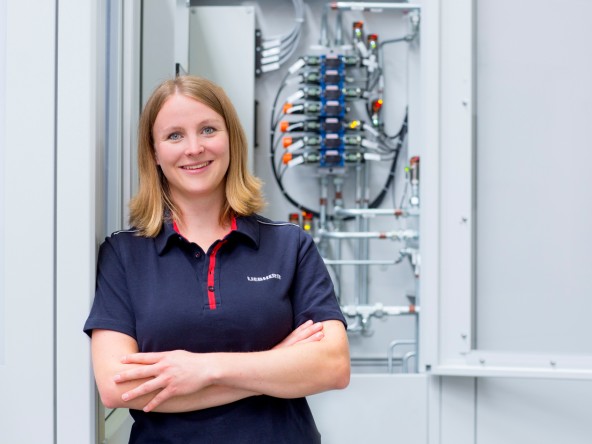
In conclusion: what else would you perhaps like to say?
Sabine Fetzer: I can only advise young women who are interested in technical professions to do as many internships as possible in order to get to know the different occupations and companies!
Walter Ferstl: We have even developed a creative solution in the current situation and continue to offer young women the possibility of gaining practical experience with our “internship to go”.
Wolfgang Kern: The MuT project has a large reach in this region: Liebherr was a pioneer here, and many other companies are now interested in it. This is a huge achievement by Mr Ferstl, and I would hope that this great partnership between Liebherr and the Maria Ward school will remain in place even when Mr Ferstl and I eventually retire.
Michael Messer: I am happy to agree with that! Liebherr is absolutely convinced by this project as a contribution to knowledge transfer and personal development. We’ll keep at it!

